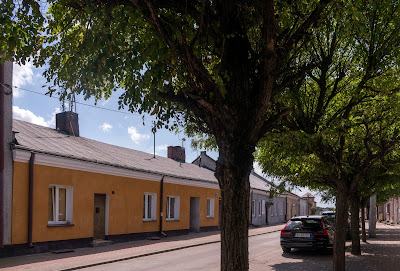According to the Royal Horticultural Society, "biennial bearing is a problem in some apple trees, where they crop heavily in one year and then produce little or nothing the next." Thinning the fruit and pruning the trees can help; I do neither and so my 100% organic apples appear only on even-numbered years.
As in 2022, this year, I will have an embarrassment of apples. The trees are full. Below: the trees nearest the street get the most sunlight, and hence bear the most fruit.
Now, the apple you see here is the antonówka, a traditional varietal that's become almost impossible to buy in the shops. Tangy, sharp yet sweet, it is the ideal apple for baking apple charlotte (szarlotka), but it's also the perfect cider apple. However, the antonówka biała, or śmietankowa ('white' or 'creamy') apples that my trees bear don't keep well; a few weeks after picking, the fruit begins to decompose from within. This means that to make cider from them, I have to work fast. In 2022, I managed to make 45 litres. This year, I aim to make more (it has to last two years, after all!).
The limiting factor is my slow juicer, which can only make half a litre of juice at a time. The juice needs to be strained, as the pulp of the antonówka apple is dense. Even running the juice – and later the cider – through a sieve three times still results in a half-centimetre or more (see below) of sediment at the bottom of each half-litre bottle. Still, tastewise, this is an excellent apple from which to make cider. It's sharp and fruity and strong.
Windfall apples need to be rinsed in running water, cut open to check for inhabitants; only clean apple flesh goes into to the juicer. The cider-making process uses a lot of water, for the apples and for keeping all the utensils clean. Rather than cram the cider-making into the last weekends of September, this year I have made an earlier start. Storms and high winds knock apples from the trees prematurely. Today and yesterday, I have been clearing the ground under the trees to make it easier to pick recently fallen apples.
Left: the first five-litre demijohn (removed from its basket). This is a trial batch, in this photo, I'm half-way into the filling process. The finished product will be clear; the sediment settles as the cider ferments. (The juice has already been filtered twice and there will be a third filtration before bottling.) Selection of apples is crucial at this stage; minimum bruising, no wormholes – and the apples must be large – juicing small ones is suboptimal, a waste of time and energy. One innovation this year – I'm cutting the apples to avoid juicing the pips. This both improves flavour and reduces sediment.An eternity in Heaven?
This time two years ago:
Habit or obsession?
What makes scenery scenic?
This time seven years ago:
Theresa May flies into Warsaw
This time eight years ago:
Announcing the start of the Radom railway line modernisation
This nine years ago:
In praise of the (Polish-built) Fiat 500
This time 11 years ago:
Llanbedrog Beach and a farewell to North Wales
This time 12 years ago:
To the Polish seaside, by night train
This time 13 years ago:
Accounting for the past - 20 years on from PRL's fall
This time 14 years ago:
An introduction to fine British cheefef
This time 16 years ago:
Over the Peaks by bus









































